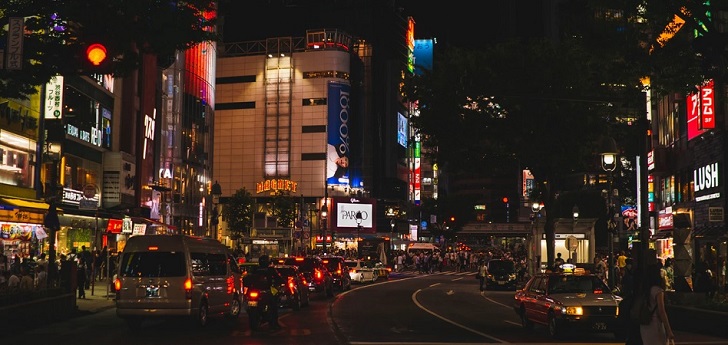Tokyo climbs to the podium of the most attractive cities for retail before the Olympic Games
The report, sponsored by Tendam and with the support of the Instituto de Empresa, identifies for the second year in a row, the one hundred most attractive global cities for retail based on about fifty criteria.

Tokyo rises among the most attractive cities for retail on a global scale. Right before the 2020 Olympic Games, which will take place in the Japanese capital, Tokyo climbs five positions and sneaks into the podium of the great global metropolis snatching bronze from Singapore, as revealed by the second edition of the Hot report Retail Cities.
The Asian city is driven by the development of its gigantic metropolitan area and the strength of the Japanese economy in a global environment characterized by uncertainty. These and other factors boosted the capital of Japan to the third position of the ranking, which in 2019 is still led by New York and Los Angeles is in second position.
Compared to the previous edition of the Hot Retail Cities, the other big rise is Miami, which is in seventh position after climbing six positions. Instead, Boston leaves the top ten, while Singapore drops from third to fifth, Chicago goes from fifth to sixth and Hong Kong is in the eighth position, two steps below the previous year.
The other big rise is Miami, that is now number seventh after climbing three positions
Hot Retail Cities 2019 is edited by Mds with the collaboration of Tendam, one of the leading European fashion retailers in the premium mass market segment, and the collaboration of the Instituto de Empresa. In this edition, London stays in the top ten and as the first European city for retail despite Brexit. San Francisco, in fourth position, and Shanghai, in the ninth, also remain unchanged compared to last year’s report.
The study analyzes for the second consecutive year the conditions of the main global cities for the expansion of retail companies and points out the one hundred most attractive cities for retail today. In its second edition, Hot Retail Cities gains interest by recording the evolution of each city in the global ranking, with ascents and descents in the leaderboard, and with entries and exits in the global top 100. Cairo, Krakow, St. Petersburg and Kiev are in this sense the four incorporations in the ranking, from which Belgrade, Accra, Buenos Aires and Tehran leave.
Top 10

Methodology
Cities are increasingly the arena in which fashion companies draw their expansion plans. Since 2008, more than 50% of the world’s population lives in cities and the urban share could reach 60% in 2030. The urbanization process is in fact one of the most important phenomena in the history of mankind, a transformation that impacts in economic and social aspects and, of course, in the activity of large global retailers.
Hot Retail Cities launches its second edition with the purpose of helping fashion companies to know the cities in which they currently operate or in which they could operate. The report offers elements of analysis to know the conditions presented by a total of one hundred cities around the world for trade activity. According to these characteristics, the document measures the degree of excellence of each city for a type retailer.
Demography, economics, politics, socio-economic environment, tourism, retail, fashion, air quality and trendy cities are the eight major areas that have been studied to rate these cities, taking into account criteria such as population , wealth, GDP growth, minimum wage, tax barriers, airport traffic, tourist numbers or the entrepreneurial climate. The different indicators, measured through a wide plurality of prestigious public and private sources (from the World Economic Forum to the United Nations or The Heritage Foundation), are weighted according to the direct impact on commercial activity and have been prorated scores. In this way, Hot Retail Cities establishes the ranking of the 100 cities of greatest excellence for a type retailer from among the 150 cities analyzed.
For the first time, the 2019 edition of the report introduces a new weighting criterion in its analysis of cities: air quality. With a weighting of ten points over a thousand, the report uses the average pollution rates, based on the US Air Quality Index.
According to Jaume Miquel, CEO of Tendam, “within the current changing environment, the big cities become even more relevant, concentrating more and more retail activity in a new, changing environment”, For his part, Eduardo Ruiz, director of the PD Retail of the Instituto de Empresa, remembered that “it seems that we are at the beginning of a global slowdown” and in a process of changing attention poles by the global gangs. "It seems that interest for brands now and in the coming years will be even more focused on the American and Asian markets," he adds.
Pilar Riaño, editor in chief of Mds, emphasizes on the other hand that the report presented today in Madrid and the evolution of the ranking with respect to the first edition shows how, like countries, “cities do not offer stable long-term frameworks, and that its conditions fluctuate at such a speed it forces companies to constantly analyze their suitability ”.


info@themds.com
Validation policy for comments:
MDS does not perform prior verification for the publication of comments. However, to prevent anonymous comments from affecting the rights of third parties without the ability to reply, all comments require a valid email address, which won’t be visible or shared.
Enter your name and email address to be able to comment on this news: once you click on the link you will find within your verification email, your comment will be published.